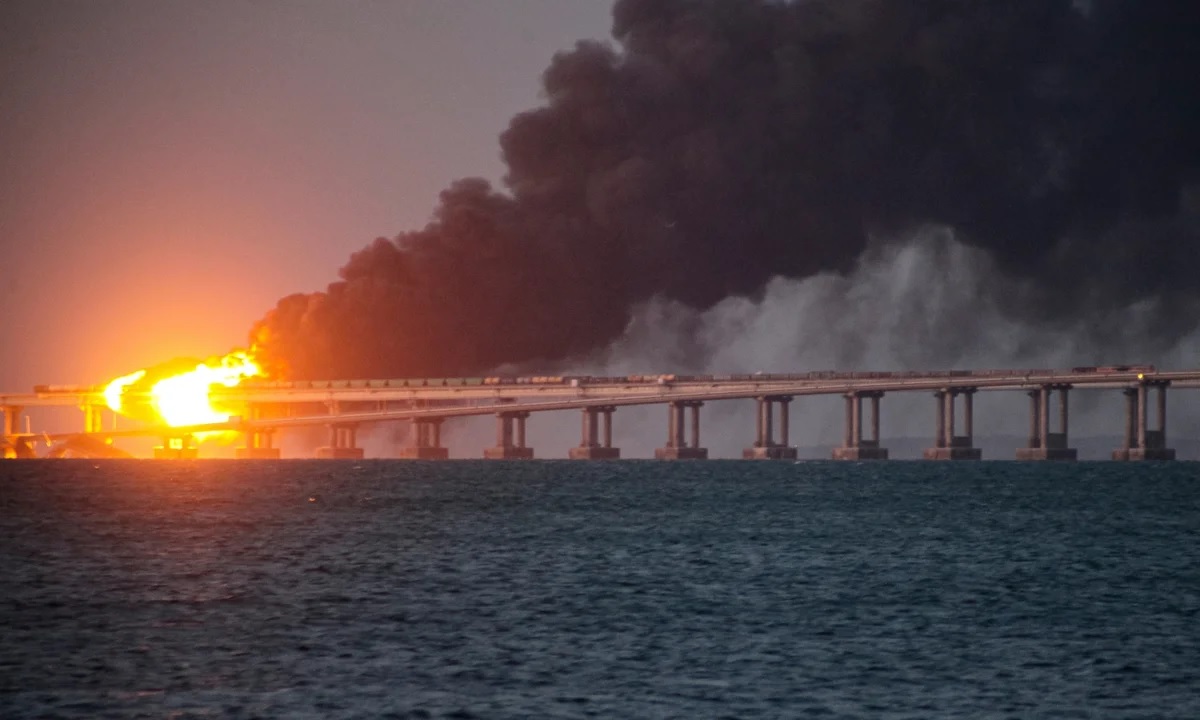Ukraine on Tuesday, June 3, 2025, carried out a powerful underwater explosion that severely damaged the Kerch Bridge, a critical road and rail link between Russia and the occupied Crimean peninsula.
The blast targeted the underwater supports of the bridge, disrupting a key Russian supply route.
Ukraine’s SBU security service took responsibility for the operation, which involved months of planning and utilized over a metric tonne of TNT.
It marks the third time Ukraine has targeted the 12-mile-long bridge since the start of the full-scale invasion in 2022.
This strike comes shortly after another high-profile operation by Ukraine, a sophisticated drone raid on Russian strategic bomber bases.
It reportedly damaged around 34% of Russia’s cruise missile carriers, according to President Volodymyr Zelenskyy.
Together, these actions represent a bold escalation by Ukraine, directly challenging the narrative advanced by U.S. President Donald Trump that Ukraine holds few strategic advantages.
The Kerch Bridge is a major infrastructure project personally championed by Russian President Vladimir Putin.
It was inaugurated by him in 2018, holds symbolic and logistical importance for Moscow.
Russia uses it to transport troops and supplies into occupied Ukrainian territory.
Lt Gen Vasyl Maliuk of the SBU, who oversaw the operation, called the bridge “an absolutely legitimate target.”
His comment emphasized Ukraine’s intent to respond forcefully to any manifestations of Russian occupation.
He reiterated Ukraine’s stance that “Crimea is Ukraine.”
Video footage released by the SBU showed an underwater blast and debris scattered across the bridge structure.
Russian officials temporarily closed the bridge to traffic for about four hours, confirming that road traffic was suspended.
Despite the damage, no casualties were reported in the immediate aftermath of the explosion.
Russia responded angrily, accusing Ukraine of terrorism after two additional railway bridges in Russia were reportedly destroyed over the weekend.
These attacks resulted in two train crashes that killed seven people and injured 113 others, including children.
At the same time, Russian missile attacks on the northeastern Ukrainian city of Sumy killed at least four civilians and wounded 25 others.
Zelenskyy condemned the strike, arguing it demonstrated Russia’s clear unwillingness to end the war.
On the diplomatic front, Ukraine confirmed it had been invited to the upcoming NATO summit in The Hague, scheduled for June 24-26.
Zelenskyy welcomed the invitation, calling it significant and suggesting that exclusion would have been seen as a win for Russia.
The invitation follows some speculation over tensions between Ukraine and elements of the Trump administration.
Meanwhile, peace negotiations remain at a stalemate.
Talks held in Istanbul failed to produce a breakthrough after Russia rejected Kyiv’s proposal for an unconditional ceasefire.
Kremlin spokesperson Dmitry Peskov tempered expectations, saying it was “wrong to expect immediate solutions and breakthroughs” due to the complex nature of the conflict.
Instead, Russia proposed a limited ceasefire in select frontline areas for two to three days, according to its lead negotiator.
Although the talks were brief, lasting under two hours, both sides agreed to a major prisoner exchange and presented roadmaps for peace.
However, the Russian proposal, leaked by state media, included demands that Ukraine withdraw from four regions in the east and south.
Moscow claims to have annexed these regions, a precondition Kyiv is unlikely to accept.
Zelenskyy’s chief of staff, Andriy Yermak, and Deputy Prime Minister Yulia Svrydenko traveled to the U.S. this week.
The aim of their trip was to advocate for increased defense aid and stricter sanctions against Russia.
“We plan to talk about defence support and the situation on the battlefield, strengthening sanctions against Russia,” Yermak wrote on Telegram.
Despite some international calls for a summit involving the presidents of Russia, Ukraine, and the U.S., Peskov dismissed the possibility in the near term.
He said such a meeting could only occur once negotiators from both sides reached a concrete agreement.
The White House stated that Donald Trump is “open” to the idea of a summit, a proposal also backed by Zelenskyy and Turkey’s President, Recep Tayyip Erdoğan.
Zelenskyy’s planned participation at the NATO summit is being closely watched, as experts say it signals continued support for Ukraine among Western allies.
According to them, it also underscores the shifting dynamics in both military and diplomatic theaters.







